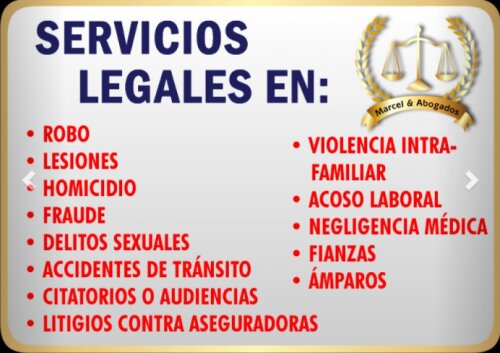Best Collaborative Law Lawyers in Mexico
Share your needs with us, get contacted by law firms.
Free. Takes 2 min.
Free Guide to Hiring a Family Lawyer
Or refine your search by selecting a city:
List of the best lawyers in Mexico
About Collaborative Law in Mexico
Collaborative Law in Mexico is an innovative approach to dispute resolution that focuses on cooperation and mutual agreement rather than adversarial court battles. It involves a team-oriented strategy where both parties, along with their respective lawyers and sometimes other professionals, work together to resolve their differences. This method is particularly popular in family law cases, such as divorces, where preserving relationships and minimizing hostility is prioritized. Collaborative Law aims to find solutions that consider the best interests of all parties involved, often leading to more amicable settlements and a quicker resolution process.
Why You May Need a Lawyer
There are several situations where engaging a lawyer experienced in Collaborative Law may be beneficial:
- Divorce or separation where both parties wish to reduce conflict and reach a mutually satisfactory agreement.
- Child custody arrangements that require respect and sensitivity towards everyone's needs.
- Business disputes where the relationship between parties needs to be maintained post-resolution.
- Probate and estate matters where family harmony is a priority.
- Any legal situation where a cooperative, problem-solving approach could result in a better outcome than traditional litigation.
Local Laws Overview
Mexican laws on Collaborative Law emphasize privacy and confidentiality, aiming to keep the disputes and the resolution process out of court records. The framework is designed to support voluntary disclosure and transparency while ensuring that resolutions are fair and legally binding once agreed upon. Here are some key aspects:
- The participation agreement binds both parties and their lawyers to work collaboratively and withdraw from representation if the process fails and goes to litigation.
- Collaborative Law is primarily used in family law but is expanding to other areas, given its focus on non-adversarial resolution.
- Legal guidelines stress the importance of neutrality and impartiality for any third-party professionals involved in the process.
Frequently Asked Questions
What is the main goal of Collaborative Law?
The main goal is to resolve disputes amicably and efficiently without going to court, preserving relationships, and fostering a cooperative environment.
Can any lawyer act as a collaborative lawyer?
No, lawyers need specialized training in Collaborative Law to understand the specific processes and collaborative techniques involved.
What happens if the collaborative process fails?
If the process fails, the involved lawyers must withdraw, and the parties will need to engage different lawyers for litigation.
Is the agreement reached in Collaborative Law legally binding?
Yes, once the agreement is finalized, it can be made legally binding, similar to agreements reached through litigation or mediation.
How long does the collaborative process usually take?
The duration varies, but it is generally quicker than going through court proceedings, depending on the complexity of the issues and the parties' willingness to cooperate.
What are the benefits of choosing Collaborative Law over litigation?
Benefits include reduced costs, faster resolution, confidentiality, preservation of relationships, and mutually satisfactory agreements.
Can children be involved in the Collaborative Law process for family matters?
Children's voices can be considered through child specialists, but direct involvement is typically avoided to protect their wellbeing.
How are financial matters handled in this process?
Both parties agree to a full exchange of financial information, often with the help of financial professionals to ensure transparency and fairness.
Is Collaborative Law confidential?
Yes, the process is confidential. Neither parties can use information disclosed during the process in future litigation if it fails.
Can international disputes be resolved through Collaborative Law in Mexico?
Yes, Collaborative Law can be applied to international disputes as long as both parties agree to the process and abide by the agreed guidelines.
Additional Resources
For individuals seeking more information on Collaborative Law in Mexico, the following resources may be helpful:
- Mexican Bar Association - Provides guidelines and a directory of certified collaborative lawyers.
- Local family law courts - Offer resources and can guide you in initiating the collaborative process.
- Organizations like the International Academy of Collaborative Professionals (IACP) - Offer further information and support networks.
Next Steps
If you need legal assistance in Collaborative Law, consider the following steps:
- Research and reach out to lawyers who specialize in Collaborative Law. Ensure they're certified and experienced in this field.
- Prepare a list of objectives and terms that you're willing to negotiate on during the collaborative process.
- Schedule an initial consultation to discuss your case and determine if Collaborative Law is suitable for your situation.
- Sign a participation agreement to commit to the process with your lawyer and the other party involved.
- Engage with other professionals as needed, such as financial advisors or child specialists, to support the process.
Lawzana helps you find the best lawyers and law firms in Mexico through a curated and pre-screened list of qualified legal professionals. Our platform offers rankings and detailed profiles of attorneys and law firms, allowing you to compare based on practice areas, including Collaborative Law, experience, and client feedback.
Each profile includes a description of the firm's areas of practice, client reviews, team members and partners, year of establishment, spoken languages, office locations, contact information, social media presence, and any published articles or resources. Most firms on our platform speak English and are experienced in both local and international legal matters.
Get a quote from top-rated law firms in Mexico — quickly, securely, and without unnecessary hassle.
Disclaimer:
The information provided on this page is for general informational purposes only and does not constitute legal advice. While we strive to ensure the accuracy and relevance of the content, legal information may change over time, and interpretations of the law can vary. You should always consult with a qualified legal professional for advice specific to your situation.
We disclaim all liability for actions taken or not taken based on the content of this page. If you believe any information is incorrect or outdated, please contact us, and we will review and update it where appropriate.
Browse collaborative law law firms by city in Mexico
Refine your search by selecting a city.

















